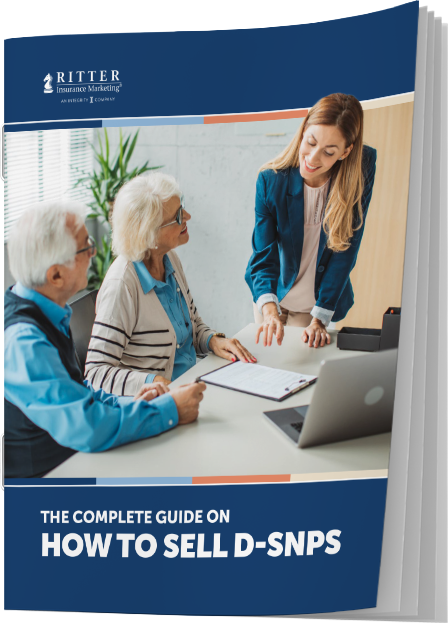Strategizing your sales during Medicare’s lock-in period is a surefire way to carry your business through the health insurance blues.
It’s what can set your business apart from a seasonally profitable to an annually profitable endeavor.
But what’s one way to grow outside of AEP? Contract for a Medicare Special Needs Plan!
Ritter’s Contract Now makes contracting plans, like the Medicare SNPs, easier. You can add carriers’ products to your cart, review and edit as necessary, and sign to complete each contract.
Note: Contract Now is only available to agents registered with Ritter. If you’re newly registered, you must speak with our Sales team to activate the feature.
What Is a Medicare SNP?
Medicare Advantage Special Needs Plans (SNPs) are types of Medicare Advantage (MA) coordinated care plans (CCPs) designed to provide care to Medicare-eligible individuals with specialized needs. For this reason, enrollment is limited to people with certain diseases or characteristics.
What’s one way to grow outside of AEP? Contract for a Special Needs Plan.
While these plans won’t work for every client, they are valuable for agents trying to do business outside of AEP. Many SNPs have Special Enrollment Periods (SEPs) that let your eligible clients join at any time, not just during AEP
Let’s look at the framework of SNPs, the types of plans, and when your clients can enroll.
How Do SNPs Work?
SNPs are private plans that, by law, must cover all medically necessary and preventative services that would be covered under Original Medicare. It must also provide prescription drug coverage normally covered under Part D.
If you’re looking for more info about SNPs, check out these frequently asked questions and to learn the difference between C-SNPs and D-SNPs!
Each SNP offers their members specialized benefits and services based on their group. These groups can be either specific provider networks or formularies.
For example, a C-SNP might have a more comprehensive list of drugs on the formulary since it’s designed for members with chronic conditions. It’s important to research each plan to see what exactly is covered and how that fits your client’s needs.
Who Is Eligible for a SNP?
There are three different types of SNPs to serve different populations:
- Chronic Condition Special Needs Plans (C-SNPs)
- Dual-Eligible Special Needs Plans (D-SNPs)
- Institutional Special Needs Plans (I-SNPs)
The eligibility requirements vary for each plan.
C-SNPs
Medicare C-SNPs cover those with chronic conditions on Medicare, and the coverage is tailored to their specific illness.
To qualify, an individual must have one or more of the following diagnoses on this chronic conditions list:
- Chronic alcohol and other drug dependence
- Autoimmune disorders
- Cancer, excluding pre-cancer conditions or in-situ status
- Certain cardiovascular disorders
- Chronic heart failure
- Dementia
- Diabetes mellitus
- End-stage liver disease
- End-stage renal disease (ESRD)
- Certain severe hematologic disorders
- HIV/AIDS
- Certain chronic lung disorders
- Certain chronic and disabling mental health conditions
- Certain neurologic disorders
- Stroke
Visit CMS.gov to see a full list of qualifying conditions. Read our comprehensive post, The Beginner’s Guide to C-SNPs, to discover more about helping your chronically ill clients with these plans
D-SNPs
The Dual Eligible Special Needs Plan (D-SNPs) is the most common type of SNP. To enroll in a D-SNP, a client must qualify for both Medicaid and Medicare. If they do, most of their medical costs will be covered by the plan.
With different tiers and acronyms, Medicaid eligibility and D-SNP types can get complicated. Despite the learning curve, selling D-SNPs boasts many benefits and should arguably be the first SNP to add to your portfolio.
Check out our comprehensive post, The Beginner’s Guide to D-SNPs, to start learning about these growingly popular plans.
Did you know we created an in-depth eBook on D-SNPs? Check it out!

I-SNPs
Last are Institutional Special Needs Plans (I-SNPs), which provide coverage for people living in an institution or requiring home nursing care. To be eligible for an I-SNP, MA-eligible individuals for longer than 90 days that need the level of care must be provided in:
- A long-term care (LTC) skilled nursing facility (SNF)
- An LTC nursing facility (NF)
- An SNF/NF
- An intermediate care facility for individuals with intellectual disabilities
- An inpatient psychiatric facility
I-SNPs are the least common of the three. Some may only be offered by insurance carriers while those that agents can sell may be non-commissionable. If you’re interested in selling these plans, make sure to research them thoroughly and check the fine print of your contracts.
When Can Eligible Individuals Enroll in SNPs?
Normal enrollment for a C-SNP occurs during an Initial Election Period (IEP) or the Annual Enrollment Period (AEP), but a client can get a Special Enrollment Period (SEP) if they have a doctor’s documentation of a newly acquired chronic condition.
D-SNPs also allow beneficiaries to join a plan upon becoming eligible for one. This SEP lasts for three months after their change in dual-eligible status or their notification of the change — whichever is later. Additionally, there is an SEP that allows beneficiaries to join or switch D-SNPs once a month (as long as they and the D-SNP meet certain criteria), which makes them very valuable during lock-in.
While these plans won’t work for every client, they are valuable for agents trying to do business outside of AEP.
Any member of that plan will have an SEP to enroll in another plan if:
- A client moves out of their SNP’s service area
- The SNP leaves the Medicare program
With I-SNPs, beneficiaries can join a plan upon becoming eligible for one. They can also switch or disenroll from I-SNPs at any time — as long as they remain eligible for this type of plan.
Fuel Lock-In with SNPs
As you’re pursuing leads during lock-in, you should definitely consider selling Medicare SNPs to clients who fall into one of the two categories:
- Chronic
- Dual Eligible
Make sure to research each individual plan to see the different benefits and services that are available so you can choose the right fit for your client.
SNPs can keep your business thriving when other agents’ sales hit a lull. When you look at your annual growth, you may very well see the benefits of adding SNP sales to your business formula!
Ritter’s here for your SNP contracts and beyond! Besides helping you build a competitive portfolio, we offer sales support, exclusive events, useful technology, and more. Register for free to get started today!







Not affiliated with or endorsed by Medicare or any government agency.
Share Post